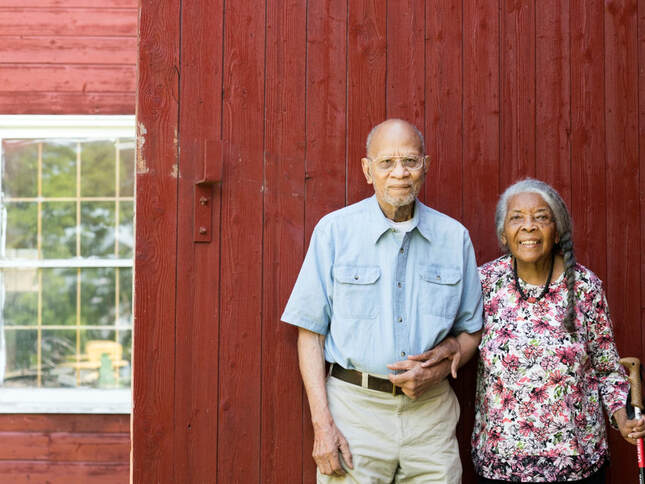A Living Legacy: Jack and Lydia Clemmons
|
The Clemmons Family Farm honors the extraordinary lives of Jackson and Lydia Clemmons, who owned the farm, located in Charlotte, Vermont, from 1962 to 2023. Clemmons Family Farm, a Black-led 501c3 nonprofit organization, purchased the farm in March 2023 under our mission-driven work to preserve and protect Black land and cultural heritage assets. We actively promote the celebration of heritage as a continuum in which we learn from our past, shape our present, and invest in our future.
Celebrating their 100th birthdays in 2023, Jack and Lydia Clemmons are among the oldest living African-American Vermonters. |
The Farm has been in a gradual transition phase from a private family-owned farm to a non-profit organization offering K-12 ethnic studies and educational enrichment programs, and community-building engagements. Honoring the example of Jack and Lydia's amazing lives and work, we use creative placemaking and the power of African-American and African diaspora people, arts, culture and history to foster a loving and supportive multicultural community in Vermont.
Defying Societal Expectations of Race and Class
Jack and Lydia's decision to buy an old run-down farm in rural Vermont defied the social pressures and expectations of their Black and white communities alike. Many people in the Black community of the 1960's perceived farming and rural life as things to escape- not to embrace. Most of Jack and Lydia's family, friends and colleagues in the mid-west and rural southern parts of the U.S. believed that the professional couple was making a mistake to move to a small town and live on a farm when they could have lived in a modern home in the city. They felt that the young doctor and nurse were "going backward" by deliberately choosing a lifestyle that included manual labor, working the earth, driving tractors, canning vegetables and mucking out the stalls of cows, pigs and chickens. They also worried about Jack and Lydia's decision to move to what was then the whitest state in the country. "Vermont? There aren't any Black people in Vermont!", Black friends and family members would exclaim. "And why on earth would you want to buy a big old place like that?"
Meanwhile, the white professional community in Vermont in the 1960's perceived Burlington and its neighboring suburbs, like Shelburne, as "the place to be" for the newcomers. Well-meaning colleagues advised them against investing in a Vermont farm, especially in a little farm town like Charlotte. "You're from Cleveland! Why go all the way out there? Why would you want to buy an old farm?," white colleagues would ask the young couple.
Between the 1960s and 1990s, passersby driving or walking by the large white farm house with the big red barns on Greenbush Road would often mistake Jack, on his tractor or lawn mower-- or Lydia, kneeling in the rich soils of the farm to weed her vegetable garden-- as the hired help. Curious, they would stop to ask Jack or Lydia if they could speak with the owners to learn more about the Farm. They were speechless when they found out that the humble African American couple in their simple grass-stained clothes were not only the actual owners of the beautiful property, they were also a doctor and a nurse!
Jack and Lydia didn't allow others to define who they were and how they should live. Now in their 100th year, they continue to defy societal expectations. Resisting stereotypes tied to race, class, gender and age-- and not letting considerations of social status and prestige deter you from following your dreams-- are an important part of their living legacy.
Meanwhile, the white professional community in Vermont in the 1960's perceived Burlington and its neighboring suburbs, like Shelburne, as "the place to be" for the newcomers. Well-meaning colleagues advised them against investing in a Vermont farm, especially in a little farm town like Charlotte. "You're from Cleveland! Why go all the way out there? Why would you want to buy an old farm?," white colleagues would ask the young couple.
Between the 1960s and 1990s, passersby driving or walking by the large white farm house with the big red barns on Greenbush Road would often mistake Jack, on his tractor or lawn mower-- or Lydia, kneeling in the rich soils of the farm to weed her vegetable garden-- as the hired help. Curious, they would stop to ask Jack or Lydia if they could speak with the owners to learn more about the Farm. They were speechless when they found out that the humble African American couple in their simple grass-stained clothes were not only the actual owners of the beautiful property, they were also a doctor and a nurse!
Jack and Lydia didn't allow others to define who they were and how they should live. Now in their 100th year, they continue to defy societal expectations. Resisting stereotypes tied to race, class, gender and age-- and not letting considerations of social status and prestige deter you from following your dreams-- are an important part of their living legacy.






